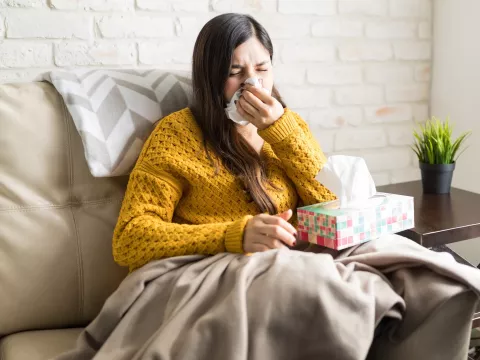- AdventHealth

While many can enjoy the outdoors on a beautiful spring afternoon, those of us with seasonal allergies have not-so-pleasant visions of sniffling our way through this time of year. In fact, seasonal allergic rhinitis, commonly referred to as hay fever, affects thousands of people across the country.
So, if you find yourself with sneezing, stuffiness, a runny nose and itchiness in your nose, the roof of your mouth, throat, eyes or ears, know that you can find the relief that you need to live your best life this allergy season. Here are some tips to help our allergy sufferers feel whole.
Plan and Act
Allergens are tough to avoid completely. Still, there are a few steps you can take as the season approaches that may make things easier on you and your whole family.
- If you have a history of allergies that flare in the spring, start your treatment plan before your symptoms start. Talk to your doctor about what treatment options are best for you and start early.
- Sweep, dust, vacuum and disinfect your house frequently. Kids, pets and adults can track in allergens like pollen and grasses. If you can't avoid them outside, at least reduce them inside.
- Get relief with over-the-counter allergy relievers. Talk to your doctor or pharmacist about what treatments are safe and effective for you.
- Get help if you need it. If you can't control your allergies with over-the-counter medications, your primary care physician might recommend a short course of anti-inflammatory or other medications. Your doctor might also refer you to an allergist for more specialized testing and treatment.
Know Infection vs. Cold vs. Allergy vs. COVID-19 Symptoms
Knowing the difference between allergies and a cold can be challenging because many symptoms overlap. Many times, the determining factors have to do with previous history. Months between February and April are when allergens in the air peak. The general rule is if there is fever present, it's more than an allergy attack and could be an infection, cold or COVID-19. Here's a handy chart that can help determine what that sneeze really means.
|
|---|
Allergies and Asthma
Asthma is closely related to allergies, as allergens can trigger an asthma attack. Asthma and some allergic reactions are similar in that they affect the airways and lungs. This can make the airways swollen and narrow, sometimes causing mucus to form.
Asthma is an inherited condition, and even if you haven't experienced symptoms since childhood, it can reappear in adulthood depending on the triggers in your environment. If you are experiencing wheezing or difficulty breathing with your allergy symptoms, it’s important to see your doctor. Wheezing — a whistling sound you hear when you breathe — can be present with allergies but is normally associated with asthma.
When to See Your Doctor
When allergies lead to more serious symptoms, it’s important to call your doctor. In more serious cases, an allergic reaction or asthma attack may require an emergency call to 911.
Here’s how to know where to go.
Call your doctor if:
- You are experiencing wheezing, even mild wheezing, for the first time
- Your wheezing is recurrent
- You are wheezing but have no history of allergies
Go to the nearest ER if:
- You are having difficulty breathing
- Your lips or skin have a bluish tint
- You begin wheezing after choking on food
- You begin wheezing after being stung by an insect
Get the Care You Need to Feel Whole
We always want you to be on your way to feeling whole. So, if allergies or asthma are slowing you down, know that our care team is here to lift you up in better health. Learn more about our connected network of primary care providers and specialists who can be your partner in keeping allergies (and other health conditions) under control.




